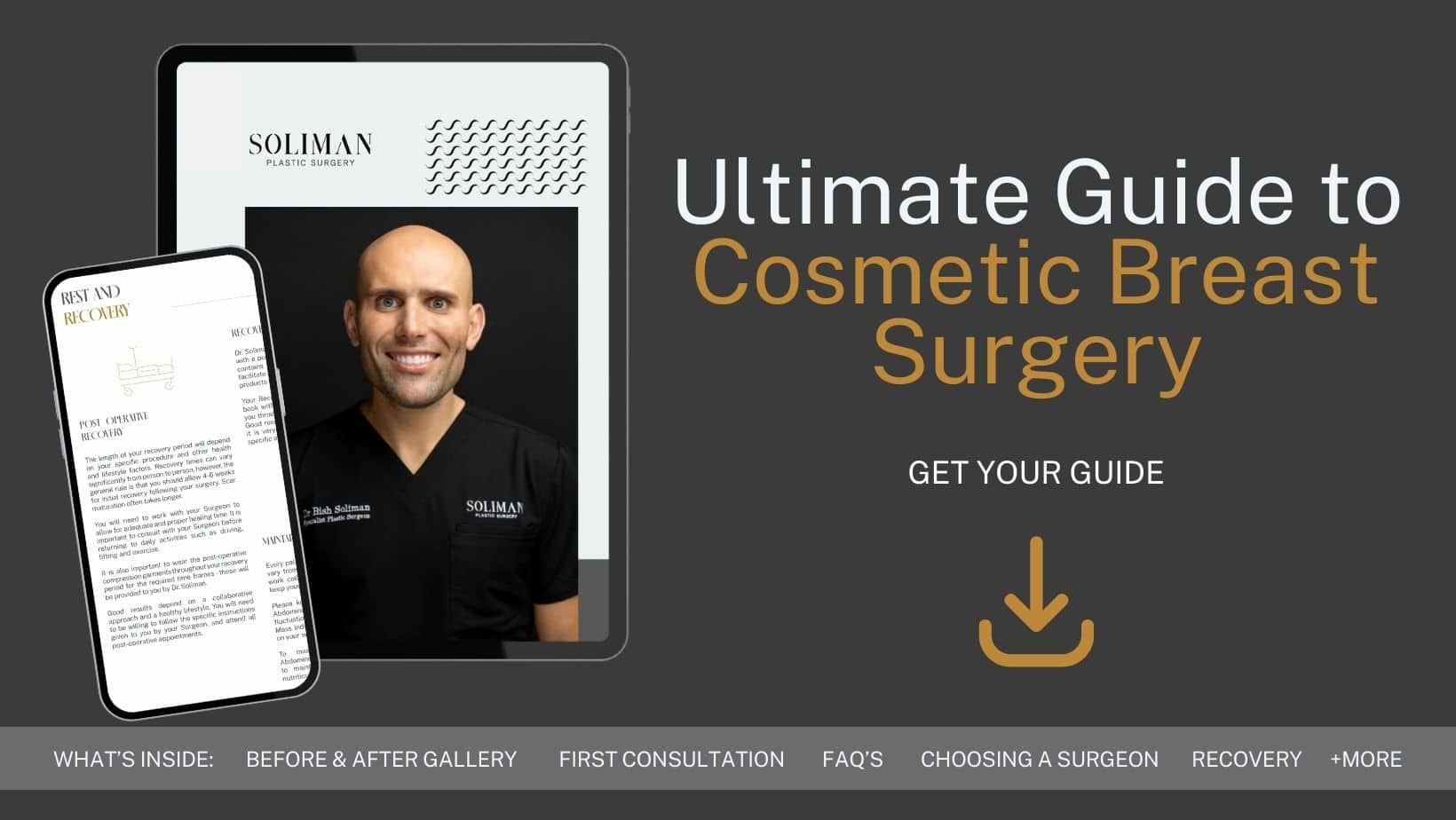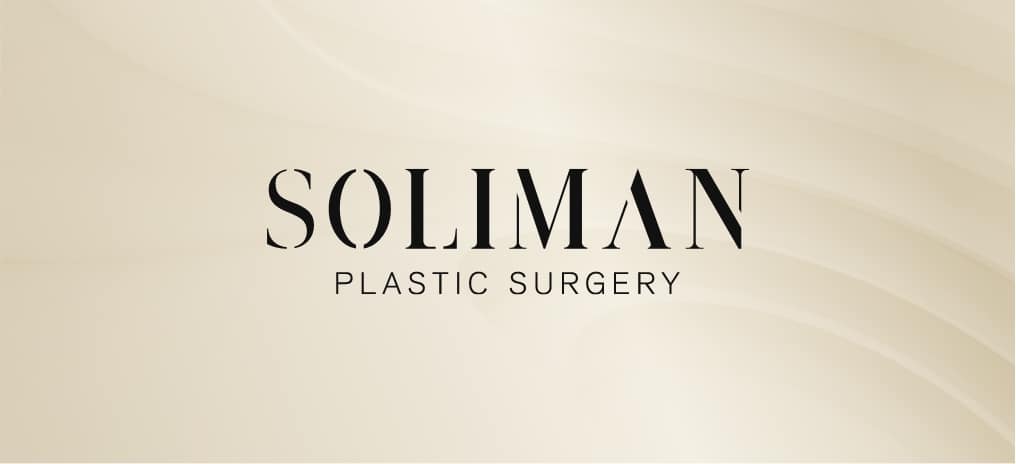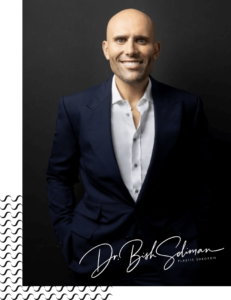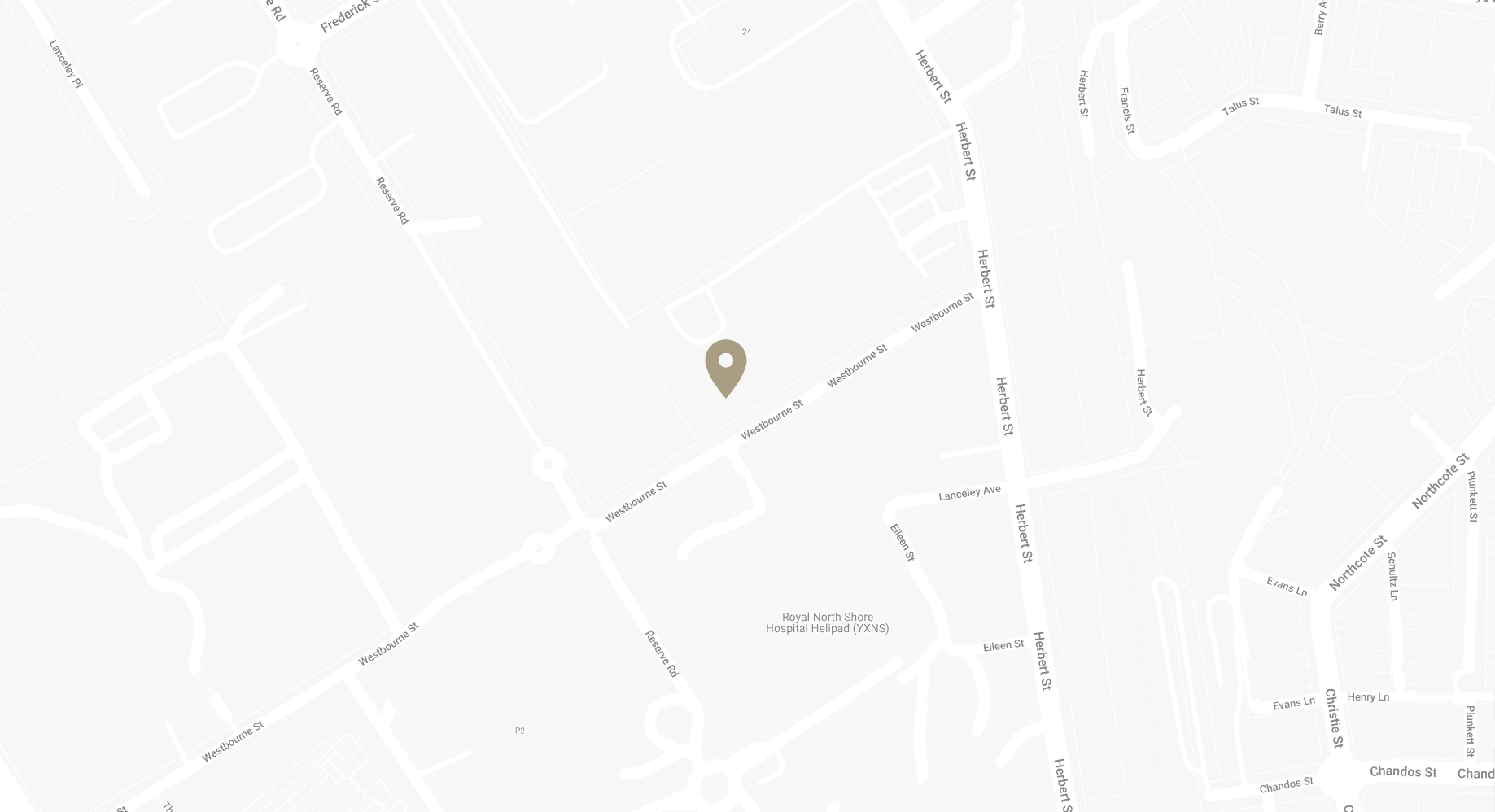Guide to Preparing for Breast Lift Surgery
Breast lift surgery is a procedure performed to raise and reshape breasts affected by breast ptosis. The operation involves removing excess skin and tightening the surrounding tissue to reshape and support the new breast contour. The nipple and areola might also be repositioned or resized to achieve a more proportionate appearance. This procedure is often sought after by individuals who have noticed changes in their breasts due to factors such as ageing, pregnancy, breastfeeding, weight fluctuations, and gravity. An important factor in the success of breast lift surgery is thorough preparation. Preparing for breast lift surgery can significantly influence the ease of your recovery and the quality of the outcomes.
In this comprehensive blog, Sydney Specialist Plastic Surgeon Dr Bish Soliman provides essential information to guide your preparation for breast lift surgery.
Download Dr Bish Soliman Cosmetic Breast Surgery Guide

Preparing Your Body for Surgery
This preparation involves focusing on your diet and nutrition, as well as addressing habits such as smoking and the use of certain medications. By taking steps in these areas, you can contribute to a smoother surgical experience and recovery:
Recommended Diet and Nutrition Guidelines
A balanced diet plays is important in preparing your body for surgery and aiding recovery. Nutrient-rich foods support your immune system, promote wound healing, and can help reduce the risk of complications. Here are some dietary guidelines to consider in the weeks leading up to your surgery:
- Increase protein intake: Protein is essential for healing and repair of tissue. Including a variety of protein sources in your diet, such as lean meats, fish, eggs, dairy products, and legumes, can aid in your recovery.
- Incorporate fruits and vegetables: A variety of fruits and vegetables provide vitamins and minerals crucial for optimal health and recovery. Vitamins A and C, in particular, are important for wound healing and immune function.
- Stay hydrated: Adequate hydration is vital for overall health and helps ensure your body is well-prepared for surgery. Aim to drink at least eight glasses of water a day, and consider increasing your intake if you are active or it is particularly warm.
- Consider supplements: Discuss with Dr Soliman if adding specific supplements could be beneficial for your preparation and recovery. Certain vitamins and minerals, such as vitamin D and iron, may be recommended depending on your individual needs.
Quitting Smoking and Avoiding Certain Medications
Smoking and the use of certain medications can significantly affect your surgery and recovery process. Here’s why it’s important to address these factors well in advance of your procedure:
Need to quite 6 weeks pre and post op
- Quitting smoking: Smoking can impair blood flow, which is crucial for healing and increases the risk of complications during and after surgery. It is strongly advised to quit smoking at least six weeks before your surgery to improve your recovery process and reduce the risk of complications.
- Avoiding certain medications and supplements: Some medications and supplements can increase the risk of bleeding, affect anaesthesia, or interfere with the healing process. It is essential to inform Dr Soliman of all medications, vitamins, and supplements you are taking. You may be advised to stop taking certain products, such as aspirin, non-steroidal anti-inflammatory drugs (NSAIDs), and specific herbal supplements, in the weeks leading up to your surgery.
Pre-Surgery Checklist: What You Need to Organise
Ensuring you have all necessary items ready for the day of your surgery can help alleviate any last-minute stress and contribute to a more relaxed experience. Consider preparing these essentials:
- Medical documents and ID: Have all required paperwork, medical records, and a form of identification readily available. This includes any pre-surgery instructions or consent forms provided by Dr Soliman.
- Comfortable clothing: Choose loose-fitting clothes that are easy to put on and take off. A top that zips or buttons up the front is ideal, as it will minimise movement and discomfort when dressing after surgery.
- Personal items: Pack personal items that you may need, such as glasses, dentures, or hearing aids. If you wear contact lenses, it’s advisable to switch to glasses on the day of your surgery.
- Toiletries and lip balm: Dry lips are common after surgery due to the effects of anaesthesia. Having lip balm and basic toiletries for freshening up can make you feel more comfortable.
- A small pillow for the car ride home: A soft pillow can provide additional support and comfort during the drive home, helping to protect the surgery area from the seatbelt.
Arranging for Help during Your Recovery Period
. Here’s how to arrange for the help you’ll need:
- Designate a responsible adult to take you home: After surgery, you will not be able to drive yourself. Arrange for a trusted friend or family member to drive you home and stay with you for at least the first 24 hours.
- Organise support for home and family responsibilities: If you have children, pets, or other dependents, ensure you have assistance in place to care for them while you focus on your recovery. This might include arranging for child care, pet sitters, or asking family members to help.
- Meal preparation: Preparing meals in advance and freezing them can be incredibly helpful. Alternatively, you could arrange for meal delivery services to ensure you have access to nutritious food without the need to cook.
- Set up a recovery area: As mentioned previously, having a comfortable recovery space set up in your home with all essentials within easy reach will allow you to rest and recover without unnecessary movement.
Taking the time to organise these elements before your surgery can significantly reduce stress and allow you to focus on your recovery. By preparing both your home and support network, you ensure that you can rest comfortably and have everything you need within reach, facilitating a smoother and more comfortable recovery period.
The Night before Breast Lift Surgery
Adhering to specific instructions the night before your surgery is crucial for your safety and the success of the procedure. Here are some guidelines typically recommended:
- Fasting: You will likely be instructed not to eat or drink anything, including water, after midnight. This is to prevent the risk of nausea and complications during anaesthesia.
- Medications: Follow Dr Soliman’s advice regarding which medications to take or avoid prior to surgery. Some medications might need to be paused or adjusted.
- Skin preparation: You may be advised to shower using antiseptic soap to reduce the risk of infection. Avoid applying lotions, perfumes, or deodorants afterwards.
- Relaxation and rest: Ensure you have a relaxing evening and aim for a good night’s sleep. Consider activities that reduce stress, such as reading or listening to calming music.
- Prepare your home for return: If you haven’t already, set up your recovery area so it’s ready for your return home. This includes arranging your sleeping area, medications, and essential items within easy reach.
What to Pack for Your Hospital Stay
Packing the right items for your hospital or clinic stay is essential for your comfort and peace of mind. Here’s what to include:
- Identification and paperwork: Bring any required identification, medical insurance details, and hospital paperwork.
- Clothing: Pack loose, comfortable clothing that is easy to put on and take off. A front-opening top is ideal for after surgery.
- Personal items: Include items such as glasses, a book or tablet for entertainment, and a phone charger. Personal hygiene items like a toothbrush, toothpaste, and face wipes can also make you feel more comfortable.
- Essential medical items: If you have been advised to bring any specific medical items or medications, ensure these are packed.
- Support garments: Dr Soliman will provide you with a specific support garment post-surgery. You will need to wear this for 6 weeks full time.
- A small pillow: A small pillow for the car ride home can provide additional comfort and support.
Essential Supplies to Have on Hand for Your Recovery Period
Having the right supplies on hand can contribute to a smoother and more comfortable recovery process. Consider these essential items:
- Medical supplies: Ensure you have a supply of any prescribed medications, as well as over-the-counter pain relievers approved by Dr Soliman. Other medical supplies might include gauze, antiseptic wipes, and ice packs for managing swelling.
- Comfort items: Soft, loose clothing that is easy to put on and take off without straining your upper body is essential. Front-opening shirts or button-up pyjamas are ideal choices.
- Nutrition and hydration: Keep a selection of healthy snacks and easy-to-prepare meals available, as well as a water bottle to encourage hydration. Consider preparing and freezing meals in advance to simplify your recovery period.
- Personal care items: Place personal care items such as tissues, lip balm, and moisturiser within easy reach. If your mobility is limited, wet wipes or a hand-held shower head can also be helpful for staying refreshed.
By taking these steps to prepare your home and recovery area, you can focus on your recuperation with peace of mind, knowing that you have everything you need to support a smooth and comfortable recovery.
Day of Surgery: What to Expect
The day of your breast lift surgery is a significant milestone on your journey. Here, we will discuss what you can expect regarding arrival times, paperwork, pre-surgery procedures, and anaesthesia:
Arrival Times and Paperwork
On the day of your surgery, punctuality is key. Arriving at the hospital or clinic at the designated time ensures that all necessary pre-surgery protocols can be completed without rush. Here’s what to keep in mind:
- Confirm your arrival time: The day before your surgery, it’s wise to confirm the time you’re expected to arrive. This time is carefully planned to allow for all pre-surgery preparations.
- Bring essential documents: Have your identification, medical insurance details, and any required paperwork ready. If you have not already submitted pre-surgery paperwork, you will likely need to complete this upon arrival.
- Check-in process: Upon arrival, you’ll go through a check-in process. This may involve confirming personal and surgery details, and making any necessary payments or deposits.
Pre-Surgery Procedures and Anaesthesia
Before your surgery begins, several steps are taken to ensure you’re fully prepared for the procedure. Understanding these steps can help demystify the process:
- Meeting with the surgical team: You may meet with Dr Soliman and anaesthetist again before the surgery. This is an opportunity to ask any last-minute questions and to confirm the details of the procedure.
- Pre-surgery assessment: A nurse will conduct a pre-surgery assessment, which includes checking your vital signs, reviewing your medical history, and ensuring you’re ready for surgery. You’ll also change into a hospital gown.
- Anaesthesia consultation: Your anaesthetist will discuss the type of anaesthesia you’ll receive. For breast lift surgery, general anaesthesia is commonly used, meaning you’ll be asleep throughout the procedure. They will explain how the anaesthesia is administered and what to expect when you wake up.
- IV line: An IV line will be inserted, usually in your arm, through which fluids and medications, including the anaesthesia, can be administered.
- Preparation for surgery: You’ll be taken to the pre-operative area where final preparations are made before you’re moved to the operating theatre. At this stage, you might receive medication to help you relax.
FAQs about Breast Lift Surgery
How long should I take off work for my breast lift surgery recovery?
- Recovery time can vary based on the individual and the extent of the surgery. It is recommended to take at least one to two weeks off work. Jobs that require physical exertion may require a longer recovery period. Dr Soliman will provide guidance based on your specific situation and the nature of your job.
Can I drive myself home after the surgery?
- No, you will not be able to drive yourself home following the surgery due to the effects of anaesthesia and the initial discomfort post-operation. It is important to arrange for someone to drive you home and, ideally, stay with you for the first 24 hours after the surgery.
When can I resume exercise after a breast lift?
- Light activities, such as walking, can usually be resumed within a few days following surgery to promote circulation. Strenuous activities, heavy lifting, and intense workouts should be avoided for at least 4 to 6 weeks or until Dr Soliman gives you the clearance to resume such activities.
What kind of bra should I wear after my breast lift surgery?
- After surgery, you’ll likely be required to wear a surgical support bra or a compression garment, which helps to reduce swelling and supports the healing tissues. Dr Soliman will advise when it’s appropriate to switch to a regular bra (usually 6 weeks). Underwire bras should be avoided during the initial recovery period until Dr Soliman advises otherwise.
How can I prepare emotionally for my breast lift surgery?
- Emotional preparation is as important as physical preparation. It’s beneficial to have a support system in place, including friends, family, or a support group who understand your procedure and can provide encouragement. Discussing any concerns or questions with Dr Bish Soliman can also alleviate anxiety. Additionally, setting realistic expectations for the outcome of the surgery is key to your emotional well-being.
Further Reading about Breast Surgery with Sydney Specialist Plastic Surgeon Dr Bish Soliman
- Read more about FAQs about Breast Lift Surgery (Mastopexy)
- Read more about What Will My Scars Look Like after Breast Lift Surgery?
- Read more about Recovery after Breast Lift
- Read more about Breast Lift Surgery Consultation: 5 Things to Know Before Meeting with Dr Bish
- Read more about Getting Back to Exercise after Breast Lift Surgery (Mastopexy)
- Read more about Getting Back to Exercise After Breast Reduction Surgery
- Read more about Post-Surgery Support Garments after Breast Surgery
- Read more about How to Reduce Swelling and Bruising after Breast Lift Surgery
- Read more about Will Medicare Pay for My Breast Lift Surgery?
Medical References about Breast Lift
- Mastopexy (breast lift) – NHS
- Mastopexy (Breast Lift Surgery) – WebMD
- Breast Lift – Australian Society of Plastic Surgeon
- Breast Lift (Mastopexy): Surgery & Recovery – Cleveland Clinic
- Breast Lift – Mayo Clinic



